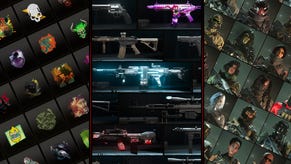The Price Gamble
Does Modern Warfare 2's success mean that Activision's price hike was justified?
Published as part of our sister-site GamesIndustry.biz' widely-read weekly newsletter, the GamesIndustry.biz Editorial is a weekly dissection of one of the issues weighing on the minds of the people at the top of the games business. It appears on Eurogamer after it goes out to GI.biz newsletter subscribers.
1.7 million people in the UK bought Modern Warfare 2 last week, a figure almost lost in the controversy which has surrounded this game for months. Amidst voices raised by the controversial airport level, it's almost possible to forget that a few months ago, it wasn't the content of Modern Warfare 2 that concerned us all - it was the price.
In the end, the higher price-point which fermented so much debate over the summer meant nothing to consumers. While specialist retailers fumed, some supermarkets discounted the game down to £26 and online behemoth Amazon dropped its price tag to £32 a few days before launch. Even considering the buying power of such retail giants, it's likely that some outlets were treating the game as a loss leader.
As such, Activision's £10 price hike was mostly absorbed by retailers, not passed on to consumers - a fact which will give publishers pause for thought in the coming weeks. There has always been a fear that if MW2 was not damaged by the higher price-point, other publishers would seek to drive their own prices up - in defiance of the obvious decline in most consumers' value perception of all media, games included.
Well, Activision pulled it off and delivered the industry's biggest-ever launch - but we're still not much the wiser as to whether consumers would have accepted the move, since most consumers never got to see it in action. Some readings of Activision's figures for the game suggest that the average selling price of MW2 was actually lower than that for Grand Theft Auto IV, which carried a perfectly normal SRP.
For Activision, of course, this is perfectly fine. It's not all that bothered about how much consumers paid for the game - as long as retailers paid the inflated trade price, then the publisher laughs all the way to the bank, regardless of how much those retailers then chose to debase their own margins in order to remain competitive.
One wonders whether this had been Activision's plan all along. From the moment that the price hike was announced, commentators sucked in their breath and marveled at what an immense risk the publisher seemed to be taking with a goose that had previously been guaranteed to lay golden eggs. Yet it may well be that Activision knew perfectly well that retailers would never sell Modern Warfare 2 at full price. Anticipating the price war that broke out between supermarkets and online retailers - with specialist stores unwillingly caught in the crossfire - it knew that it could gouge its "partners" with a higher trade price, confident in the knowledge that consumers would not feel the sting.
If that is the case, then one side of the industry can only take its hats off to Activision's clever manoeuvring, even while the retailers who have just helped to inflate the company's quarterly figures lick their wounds and glower. They'll get their own back, of course - MW2 will turn profits for companies like GAME, GameStop and GameStation for months and even years to come as copies cycle through the second-hand market - but right now, Activision is the victor, having sneakily managed to hammer retail margins for one of the biggest releases of the year into the ground.
However, everyone knows that this isn't a situation which will be repeated too often. Supermarkets will only treat a small minority of extremely high-profile, seasonal releases as loss leaders, and specialist retailers simply can't take this kind of margin squeeze indefinitely. The next publisher to try and shove its SRP up may well find that retailers are not prepared to soak up the difference this time - leaving it in the exposed position of passing the price hike on to consumers for the first time, and almost certainly doing so with a far less attractive and anticipated product than MW2.








